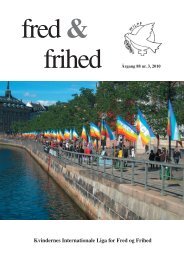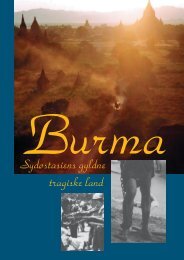Untitled
Untitled
Untitled
Create successful ePaper yourself
Turn your PDF publications into a flip-book with our unique Google optimized e-Paper software.
Britain's Meddling in Iran<br />
Britain has long been involved in meddling in Persian affairs. Over the<br />
course of the 19th century, the importance of Persia grew in direct proportion<br />
to the ambitions of the British Empire. Britain regarded Persia, with<br />
its key, central location, as the logical extension of its Indian possessions.<br />
In the face of a wave of anti-imperialist sentiment, Britain used a policy<br />
of "divide and rule," aimed at destroying the central government's<br />
authority by encouraging and arming tribal chiefs and warlords to resist<br />
any attempt by the shahs to assert authority over southern Persia.<br />
The furor of the Persian people culminated in the Constitutional<br />
Revolution of 1906-1907, a response to the impotency of the Iranian<br />
autocracy in the face of the escalating imperial encroachments of Britain,<br />
which overthrew the monarchy.<br />
The constitutionalists' quest to transform Persia into a modern nationstate<br />
was crushed by the signing of the Anglo-Russian Agreement of 1907.<br />
The bilateral accord (Iranians had no say in it) split the nation into three<br />
sections: two "spheres of influence" divided by a central "neutral zone,"<br />
over which the Iranian parliament, or Majlis, nominally retained sovereignty.<br />
The pact granted the agents of either empire exclusive control over<br />
the disposition of the natural resources contained within their respective<br />
"sphere."<br />
The geo-strategic importance of Persia to the British Empire escalated<br />
in 1908, with the discovery of vast petroleum deposits within the British<br />
sphere of influence. An infusion of materiel from Britain allowed the<br />
Iranian army, under Reza Mizra Khan's personal command, to successfully<br />
invade and occupy the former Russian sphere of influence. Backed by the<br />
British, Reza Khan dropped all pretense of constitutional rule and had<br />
himself crowned shah of Iran on December 13, 1925, establishing the<br />
Pahlavi dynasty. As everyone knows, the monarchy was ousted again, this<br />
time by the mullahs, in recent history, so that Iran is now an Islamic<br />
republic.<br />
For Iranians, democracy is not a new idea but an ongoing struggle. For<br />
a century, this Middle East Muslim country has sought democracy, only to<br />
see its efforts twice stamped out by Western powers. The time has come<br />
for Britain, and the West in general, to stop meddling in the affairs of Iran.








